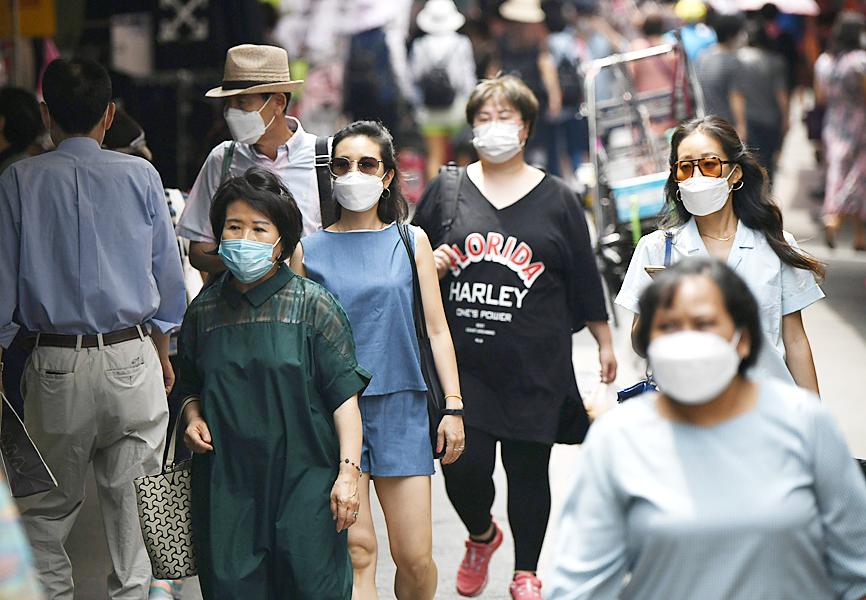The onset of summer has sparked a rise in incidents of “mask rage” in South Korea as more hot and bothered commuters either refuse to wear face coverings or leave parts of their faces exposed.
In South Korea, Japan and other countries in East Asia, widespread mask wearing has been cited as one possible explanation for the region’s relative success in bringing the COVID-19 pandemic under control.
South Korea, one of the first countries outside China to be affected by the virus, flattened the coronavirus curve in April, although it is now struggling with dozens of daily cases, mainly in and around the capital, Seoul.

Photo: AFP
To avoid a second major outbreak, the government last month required masks to be worn on all buses and subways, and inside taxis, with drivers permitted to refuse passengers without face coverings.
However, the country’s typically hot summer is making mask wearing increasingly uncomfortable, with temperatures regularly exceeding 30°C last month.
As a result, more people are refusing to wear them, or are positioning them across their chins so they leave their mouth and nose exposed.
The practice, nicknamed tuk sk — tuk is Korean for “chin” — has sparked dozens of incidents of mask rage on public transport, according to South Korean media.
Police said that they had recorded 840 fights last month, many of them involving bus drivers who remonstrated with passengers who refused to mask up, according to the Yonhap news agency.
All but one of the 43 perpetrators facing legal action were men, Yonhap said, adding that most were in their 50s and 60s.
The incidents included a woman who was briefly detained after she argued with other subway passengers who demanded that she wear a mask, and a man who was held by police after assaulting a bus driver and a fellow passenger for insisting that he cover his face.
Fears of a heatstroke pandemic have prompted firms in Japan, where temperatures are expected to soar this month and next month, to develop “cool” masks made from high-tech materials.
The sportswear maker Mizuno is selling masks made from fabrics usually found in its range of swimsuits and athletics apparel, while the material used in Yonex’s Very Cool range includes xylitol, which, it said, allows the mask to dry quickly.
“As people spend more time wearing masks to protect them against the coronavirus, we hope our technology will enable users to keep cool during the hot weather, even if just a little,” a spokeswoman for Yonex, which makes equipment and apparel for badminton and tennis, told the Kyodo news agency.
Last month, long lines formed outside Uniqlo stores ahead of the release of masks made from the clothing firm’s lightweight summer fabric. Reports said the items sold out within hours.
Other retailers have taken the theme a step further, with one knitwear maker developing chilled cloth masks with pockets for ice packs that it says keep the wearer cool for up to two hours.
Experts have warned that wearing masks in extreme heat could cause breathing difficulties, raised heart rates and dehydration.
The Japanese Association for Acute Medicine has advised people to remove their masks when appropriate and to drink water at regular intervals.

A Philippine boat convoy bearing supplies for Filipino fishers yesterday said that it was headed back to port, ditching plans to sail to a reef off the Southeast Asian country after one of their boats was “constantly shadowed” by a Chinese vessel. The Atin Ito (“This Is Ours”) coalition convoy on Wednesday set sail to distribute fuel and food to fishers and assert Philippine rights in the disputed South China Sea. “They will now proceed to the Subic fish port to mark the end of their successful mission,” the group said in a statement. A Philippine Coast Guard vessel escorting the convoy was

DISPUTED WATERS: The Philippines accused China of building an artificial island on Sabina Shoal, while Beijing said Manila was trying to mislead the global community The Philippine Coast Guard (PCG) is committed to sustaining a presence in a disputed area of the South China Sea to ensure Beijing does not carry out reclamation activities at Sabina Shoal (Xianbin Reef), its spokesperson said yesterday. The PCG on Saturday said it had deployed a ship to Sabina Shoal, where it accused China of building an artificial island, amid an escalating maritime row, adding two other vessels were in rotational deployment in the area. Since the ship’s deployment in the middle of last month, the PCG said it had discovered piles of dead and crushed coral that had been dumped

China’s military yesterday showed off its machine-gun equipped robot battle “dogs” at the start of its biggest ever drills with Cambodian forces. More than 2,000 troops, including 760 Chinese military personnel, are taking part in the drills at a remote training center in central Kampong Chhnang Province and at sea off Preah Sihanouk Province. The 15-day exercise, dubbed Golden Dragon, also involves 14 warships — three from China — two helicopters and 69 armored vehicles and tanks, and includes live-fire, anti-terrorism and humanitarian rescue drills. The hardware on show included the so-called “robodogs” — remote-controlled four-legged robots with automatic rifles mounted on their

STREET WATCH: Residents watched over barricades blocking roads and flew white flags to show that they intended to keep an eye on their neighborhoods France yesterday deployed troops to New Caledonia’s ports and international airport, banned TikTok and imposed a state of emergency after three nights of clashes that have left four dead and hundreds wounded. Pro-independence, largely indigenous protests against a French plan to impose new voting rules on its Pacific archipelago have spiraled into the deadliest violence since the 1980s, with a police officer among several killed by gunfire. On roads, the torched detritus amassed over four days of unrest was scattered amid fist-size hunks of rock and cement that appeared to have been flung during riots. Armored vehicles roved the city’s palm-lined boulevards, usually